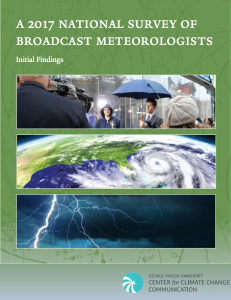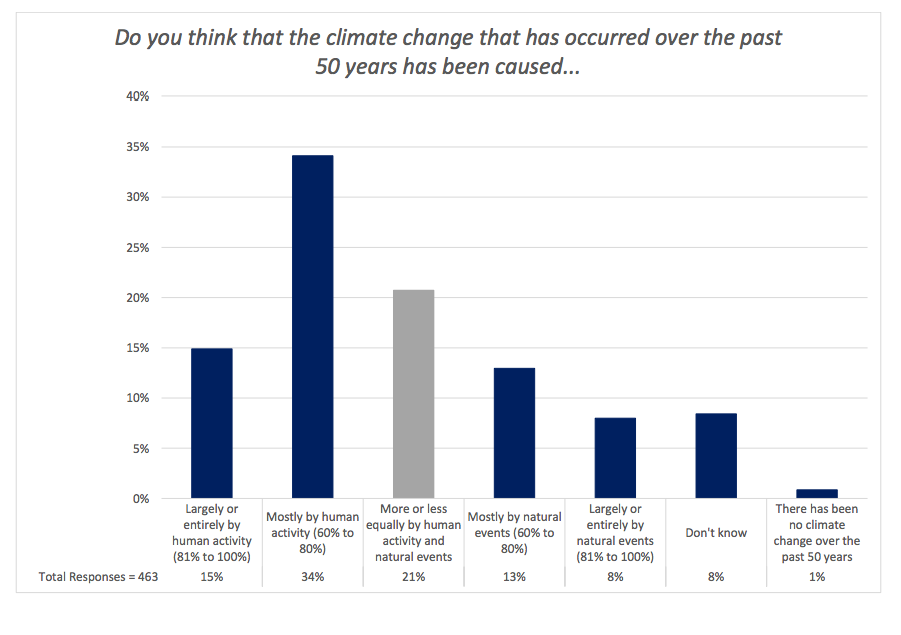3 March 2017
Weathercaster Survey Shows Increasing Acceptance of Climate Science
Posted by Dan Satterfield
 The Center for Climate Change Communication at George Mason University is out with its latest survey of TV weathercasters and their views on climate change. For the most part, it’s good news, and I was one of the survey participants. Full disclosure: I’m doing a talk on science communication with one of the authors of the study (Ed Maibach) at the American Meteorological Society (AMS) Broadcast Meteorology conference in June.
The Center for Climate Change Communication at George Mason University is out with its latest survey of TV weathercasters and their views on climate change. For the most part, it’s good news, and I was one of the survey participants. Full disclosure: I’m doing a talk on science communication with one of the authors of the study (Ed Maibach) at the American Meteorological Society (AMS) Broadcast Meteorology conference in June.
Just about 2 out of 3 survey participants have at least an undergraduate degree in atmospheric science with 9% having an MS degree in at least a related field. About the same percentage ( 2 of 3) have a CBM (Certified Broadcast Meteorologist) seal from the AMS. I was gratified to see that most weathercasters have heard of the AMS Station Science Committee since I just stepped down as chair in January!
Thoughts About The Results

Only 50% of the survey participants thought that climate change was mainly due to human activities. Just 29% think it is mainly natural. This shows there is still a lingering disconnect between weathercasters and the atmospheric science community.
The IPCC has stated it this way: It is extremely likely that human influence has been the dominant cause of the observed warming since the mid-20th century. The evidence for this has grown, thanks to more and better observations, an improved understanding of the climate system response and improved climate models.
The AMS has worked hard to educate weathercasters on the latest science, and the Station Science Committee at the AMS, along with organisations like Climate Central, and Bud Ward at the Yale Forum on Climate Change have also been heavily involved. Over the past several years, we on the Station Science Committee have brought in top climate experts to present at June the broadcast meeting, but this meeting tends to be attended by mainly CBM seal holders/ those with a degree in atmospheric science. This means we are not likely reaching those who have less science background. Are there still a lot of misconceptions out there that would disappear if we could reach them? Probably.
The data below is courtesy of Dr. David Perkins at GMU. David teased out the data for me to show the difference among those with a BS degree or CBM vs not. (Not all CBM’s have a degree in the field, but it’s now a requirement.)

Note that a majority of those with a CBM/B.S. in atmospheric science accept that the warming is mainly due to human activity. These folks are the most likely to attend an AMS/AGU science meeting. There is also a large increase among CBM’s when asked how well they think the understand the science.
Atmospheric science is a broad field, and climate science is rather different from synoptic meteorology, but anyone with a science background can quickly bring themselves up to speed. I know many degreed meteorologists who dropped their skepticism after doing just that. Those without a science background can still get their questions answered, but what is the best way to reach them?
Those That Are Quiet
It was not that long ago that some weathercasters were repeating climate myths as facts on TV and online, but that has now changed. The disappearance of ridiculously wrong statements about climate is rather profound. Probably because those that repeated these myths were quickly educated about why they were wrong, sometimes in an embarrassing way. After the incident last month at WGBH in Boston, I’d be shocked to see much of that in the future.
The silence about climate in some places is rather deafening, though, and I know of not one on-air weathercaster in Oklahoma who has talked about climate change on-air or online. Please, someone in Oklahoma, tell me I’m wrong. I suspect that a lot of weathercasters are afraid of pushback from their audience if they do talk about it, in spite of the fact that this is rare. I have shared info on climate for quite a while, and my friends Jim Gandy (S. Carolina), Paul Gross (Detroit), Erica Grow (WNBC NYC), John Morales (Miami), and Mike Nelson (Denver, and new chair of the Station Science Comm.) are prime examples, and these are just a few. Our collective experience has been that the public actually appreciates someone breaking through the political noise and answering their questions!
The Bottom Line
I’ve had chats with skeptical weathercasters and I point out that while skepticism is a natural part of science, confirmation bias is something we should all be aware of. When every major science body on Earth has agreed with the IPCC findings, the burden is now on those who remain skeptical to show why all those published papers are wrong. If you think they are indeed wrong, then publish a paper showing why, and do it in a peer-reviewed journal. That’s the way science works. I’m reminded of a friend who has a PhD in atmospheric science and his story about standing in line late at night in Wal-Mart. He was asked by a woman in hair curlers what he did, and upon answering was told that climate change was a hoax.
The lesson here is that an entrenched political worldview can lead to saying things that make you look silly, while never having the slightest thought of how you are being perceived (something I try to keep this in mind when writing these posts…) It can also cause you to miss a good opportunity to learn something while standing in the Wal-Mart check-out line in the middle of the night.
The number one thing an education teaches you is how much more you do not know. So, hang around with people who are smarter than you are and ask questions. This survey shows that a lot of weathercasters are starting to do just that.


 Dan Satterfield has worked as an on air meteorologist for 32 years in Oklahoma, Florida and Alabama. Forecasting weather is Dan's job, but all of Earth Science is his passion. This journal is where Dan writes about things he has too little time for on air. Dan blogs about peer-reviewed Earth science for Junior High level audiences and up.
Dan Satterfield has worked as an on air meteorologist for 32 years in Oklahoma, Florida and Alabama. Forecasting weather is Dan's job, but all of Earth Science is his passion. This journal is where Dan writes about things he has too little time for on air. Dan blogs about peer-reviewed Earth science for Junior High level audiences and up.